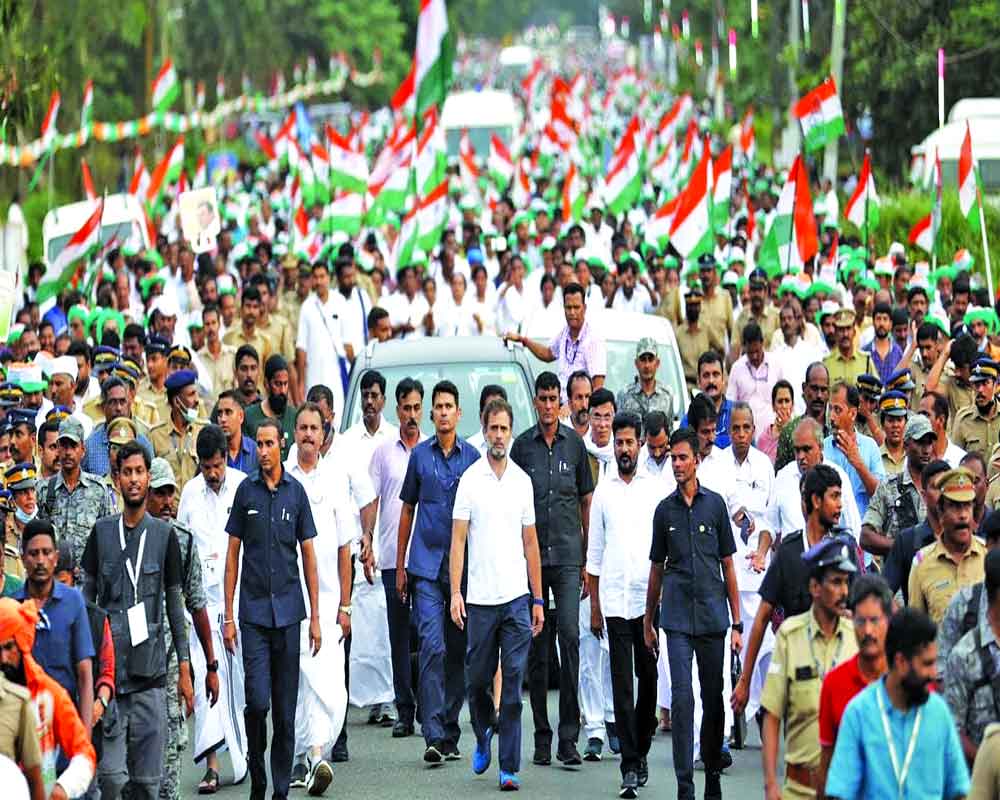Can a party that has attempted to destroy our democracy, and even carried out pogroms be the messenger of love and unity?
The Congress Party‘s Bharat Jodo Yatra led by Rahul Gandhi is gradually attracting public attention; it has even garnered a degree of respectability with celebrities from different walks of life joining the Gandhi scion. But shorn of its jamboree value, the BJY needs to be analyzed objectively for its relevance and the hope that it offers.
Is this another political circus with the intent to regain political power? Or is it a sincere message of love and unity? And if so, can Congress be counted on to deliver the utopia that it promises?
A truly objective evaluation of the track record of Congress is disappointing and even scary; it reveals a picture of expedient opportunism and questionable morality. The badge of secularism that it flaunts has often jostled with a sense of entitlement, an insatiable thirst for power, and a warped hubris that condones mass killings to avenge the death of its leaders.
The 1984 anti-Sikh carnage is a classic example of the Congress Party’s double talk.; strictly speaking, it was a pogrom, validated by every criterion that defines such sectarian violence. To call it a Hindu-Sikh riot is to mislead. The Congress Party exclusively instigated, planned, and executed a one-sided, organized massacre of over 3000 Sikhs.
The Nanavati Commission confirmed the involvement of the Congress: “The systematic manner in which the Sikhs were thus killed indicates that the attacks on them were organized. Whatever acts were done, were done by the local Congress (I) leaders and workers, and they appear to have done so for their personal political reasons….” (Nanavati Report, Part iv).
A deliberate delay in deploying the Army and Rajiv Gandhi’s famous statement,” When a big tree falls, the earth shakes" are further evidence of the Congress party’s insensitivity. That a sitting PM chose to justify these atrocities is unpardonable.
Another lesser-known pogrom also has a Congress hand. Post Mahatma Gandhi’s assassination by Nathuram Godse (a Brahmin), Maharashtra was rocked by violence that had Congress workers running amok torching Brahmin homes and killing Brahmins. While there are no official figures, some claim thousands of Brahmins lost their lives.
The historian Vikram Sampath refers to this suppressed part of our history in a recent interview. He states: “While writing ‘Savarkar: Echoes from a Forgotten Past’, several people, whose ancestors witnessed the pogrom or were affected by it, came forward to share their stories.”
He also indicated that ‘several Congress officials took part in the carnage.’
Post-independence the Congress Party’s ‘vote bank’ politics facilitated illegal immigration into Assam provoking local unrest, dissension, and a dangerous instability that triggered the Assam Students Movement. For nearly 6 years (1979-1985) the Northeast suffered through daily protests and unimaginable acts of fratricidal violence.
The widespread opposition to the CAA-NRC in 2020 which the Congress supported was essentially an attempt to safeguard the gains of illegal immigration and sustain the divisiveness of Assam so that political interests could prevail.
Qualms about Narendra Modi’s autocratic and anti-democratic demeanor are more fiction than fact. In 2002, when he was subject to overwhelming criticism for his handling of the Gujarat riots, he resigned prematurely and sought a vote of trust from the public -- a democratic gesture par excellence.
The BJP has always adhered to democratic principles at all times. In late 1999, after a successful tenure of 13 months, the BJP was forced to seek a vote of confidence as a result of a realignment of political parties. The BJP lost by a single questionable vote cast by a Congress member (Giridhar Gamang) who had ceased to be a member of the Lok Sabha after being elected to the state legislature. Yet, Atal Bihari Vajpayee (the then BJP PM) promptly resigned in the larger interest of democracy.
Contrast this with what happened in 1975: when the Allahabad high court invalidated Indira Gandhi’s election, she chose to suspend democracy and imposed a state of Emergency; the darkest period of our democracy.
India is more united today than it has ever been since Independence; there is no symbolic barrier between Kashmir and India; there is stability in Assam in contrast to the turmoil of the 1980s. And the umpteen number of massive protests (Farmers stir, CAA agitation) is ample proof that democracy is alive and kicking under the Modi regime.
The concept of a divided nation engulfed by a maelstrom of hate is an illusion and nothing more; a specter skillfully engineered by violent street protests, misrepresenting normally found street crimes as hate related and stoking the subliminal paranoia of minorities. It is a figment of imagination confined to the warped minds of negativists.
(The author, a US-based academic and political commentator, frequently writes on current affairs in India. The views expressed are personal.)


























